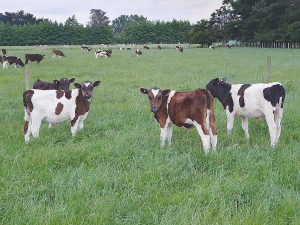Calves gain more weight in less time with probiotics included in their diet, a trial conducted by Agrifert has found.
Mobs of 50 calves, primarily Friesian bull calves, were organised randomly into a control group and a trial group on a Jyle Farms property at Mangatainoka to provide comparative data on the benefits of feeding the calves with AgriBio probiotics Fixine and Fi:d Up.
Agrifert says probiotics have become an accepted boost to human health, but farm use is relatively recent. Consumption of probiotics by farm animals boosts the natural micro-organism population in the rumen or gut, with resulting benefits to health and performance.
The control group calves were fed a conventional diet of milk powder complemented gradually by meal over the eight-week trial period. The trial group animals received Fi:d Up freeze-dried probiotics and vitamins with their milk-powder liquid and Fixine fresh live probiotics as a complement to their meal.
This trial was the first field demonstration of the effectiveness of these products, says Agrifert general manager Josh Bollen.
Positive results were expected, Bollen says, but the weight gain among the trial group calves was particularly impressive.
At the end of the eight weeks, the trial calves weighed an average of 90.9kg compared to the average 74.7kg of the control group, he says.
Among the control group calves, the average daily gain in weight was 720 grams; the trial calves gained weight by an average 840 grams per day.
Half of the trial calves ended up weighing 90kg or more with the other half tipping the scales between 70kg and 90kg.
Among the control calves, 26% weighed less than 70kg, 71% were between 70kg and 90kg, and just 3% weighed 90kg or more.
That rapid increase towards sale weight meant half the trial calves could be weaned and sold-on about two weeks ahead of almost all the control group animals - making a significant saving in feed costs and animal care and a more efficient farm operation, Bollen says.
Kyle Goodwin, Jyle Farms, was impressed with the trial results.
“Prior to the trial, I was quite sceptical of probiotics. Mid-way through, my mind was already changed; I could easily tell the difference between the control and trial mobs. The money saved just in being able to wean earlier made it worthwhile.”


















